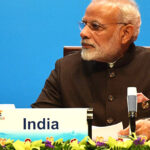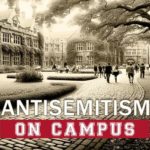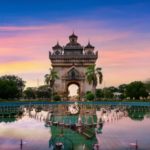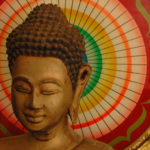
During a speech to the United Nations Human Rights Council on October 2, Luon Sovath, a Buddhist monk and human rights activist was repeatedly interrupted by Cambodia’s Permanent Representative in Geneva, An Sokkhoeurn, who questioned the legitimacy of both Sovath’s status as a monk and his claims about land rights in Cambodia. During a meeting of the 45th Regular Session of the Council, Sovath was a guest speaker of the World Organization Against Torture, a Geneva-based NGO.
“We question the status and legitimacy of this representative and of the NGO,” Sokkhoeurn said. “According to the information that the government has sent to me, he is not a real monk, he has been defrocked in Cambodia already.”

Between 2014 and 2016, the Cambodian League for the Promotion and Defense of Human Rights (LICADHO) has documented a meteoric rise in conflicts over land following Cambodia’s 2013 general election. Over 30,000 families were documented as being affected by land conflicts with the state or with private companies. In 2014, almost 50,000 people were involved in land conflicts, three times the number documented in 2013.
These events now occur behind the thick shadow of a one-party state, created after a 2017 crackdown on political opposition in the country. Prime Minister Hun Sen, who has ruled Cambodia for the past 35 years, has distanced himself from the West, banned media organizations, and intimidated human rights defenders, activists, opposition politicians, and civil society organizations in an orchestrated campaign to shrink public space for political expression.
The past year has been particularly consequential for Sovath, having his reputation tarnished by a government smear campaign that alleged that he had slept with three sisters and their mothers, evidenced only by grainy videos that appeared on a fake Facebook page. Later, the religious council controlled by the Cambodian government defrocked him, after which he fled to Switzerland fearing his own arrest. Sovath was later charged in absentia by Siem Reap prosecutors for the rape of one of the sisters as well as defamation under Articles 239 and 305 of Cambodia’s Criminal Code.
Sovath became involved in documenting human rights abuses after an incident in March 2009 when Cambodian authorities opened fire on 300 unarmed villagers from the Chi Kreng village, who were trying to harvest rice on land lost in a disputed land deal. Some of the villagers were wounded including Sovath’s brother and nephew. Several others were imprisoned. He has become well-known for using multimedia tools to document abuses by Cambodian authorities and religious leaders, which made him many enemies.
Sovath has on a number of occasions faced intimidation and charges from authorities. In 2014, he was charged with incitement to commit a felony for supposedly inciting and leading demonstrations against the government authorities by victims of land disputes in Siem Reap and Boeung Kak Lake. He also faced charges from 2013 where Sovath was accused of plotting against the Cambodian government and preventing people from voting.
He was arrested in May of 2012 by police for his participation in a protest outside a Phnom Penh Municipal Court demanding the release of 13 women from Boeung Kak Lake community who had been sentenced to more than two years in prison for supporting those whose homes had been destroyed in a forced eviction. Sovath was later taken to a temple where he was detained and forced to sign a document declaring that he would no longer be involved in human rights work. In 2011, Buddhist Supreme Patriarch Non Nget banned Sovath from pagodas claiming he had violated religious policies regarding activism in politics.
In Cambodia, land grabs and forced evictions have become a persistent human rights concern. The issue has been raised within civil society for decades and has been a serious concern among stakeholders during Cambodia’s 2019 UN human rights evaluation, the Universal Periodic Review (UPR). The Special Rapporteur on the situation of human rights in Cambodia, Rhona Smith suggested in a report to the United Nations Human Rights Council that issues related to the resettlement and compensation offered to people displaced from their land were inadequate and that disputes were not free from threats, violence and intimidation. The Secretary-General António Guterres also noted that housing and land disputes comprise the root cause of human rights violations in Cambodia. Intimidation and threats against human rights defenders in Cambodia are commonplace, as large numbers of people have been displaced to make room for real estate developments with close ties to authorities or large corporations, according to a 2014 submission by Front Line Defenders, an Irish human rights organization.
Since the 1970s, land rights remain particularly sensitive to Cambodians, dating back to the era of the Khmer Rouge, who banned the ownership of private property. Approximately 70 percent of Cambodians lost their livelihoods or access to their land. Recent attempts have prompted alarm, such as the plundering of a Cambodian wildlife sanctuary and an agribusiness company, Hoang Anh Gia Lai (HAGL), which has been accused of clearing indigenous lands.
These issues are exacerbated by tensions with the government, which has been willing to relinquish large areas of land to private enterprises for development projects or agribusiness. According to LICADHO, over 2.2 million hectares of land has been granted to private firms— affecting 420,000 people—under long-term leases through economic land concessions or ELCs. While most violate Cambodia’s 2001 Land Law, many still remain under control of the private entity or the state. Rarely does the original occupant of the land regain control. Many rural Cambodians rely on small plots of land that are used for farming. The issue becomes even more dramatic when livelihoods are directly tied to farming due to a lack of available jobs outside urban areas. About 70% of Cambodian households receive all or the majority of their income from agriculture, according to the United Nations Development Programme (UNDP).
The recent arrests, detentions and convictions of activists like Sovath have sparked outrage in Cambodia, after environmental activists, musicians, and local labor leaders have spoken up against government border demarcation with Vietnam that many claim surrenders more land to a one-time occupier. The Hun Sen government has also used the COVID-19 pandemic to issue a new law granting authorities the power to restrict fundamental freedoms and create vague offenses with seemingly unfair criminal penalties.






